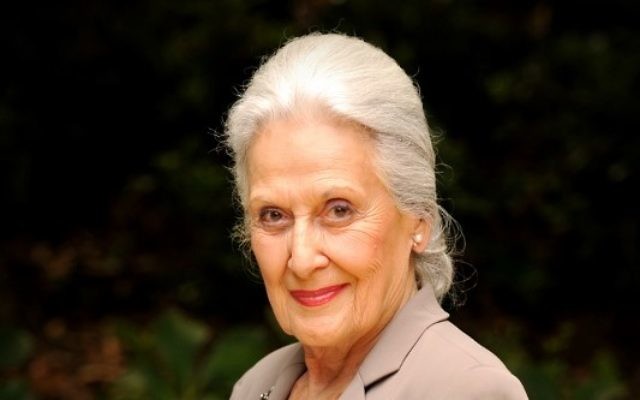A Century of Lived History
Janice Rothschild Blumberg witnessed a century of recovery and growth in Atlanta's Jewish community.
Dave Schechter is a veteran journalist whose career includes writing and producing reports from Israel and elsewhere in the Middle East.
UPDATE: Janice Rothschild Blumberg, z”ll, passed away on Feb. 21, eight days after her 100th birthday. Her memory will be a blessing.
As anyone who has been in her presence knows, Janice Rothschild Blumberg’s stories have an “in the room where it happened” quality.
This chronicler of Atlanta and Southern Jewish history is marking the centennial of an extraordinary life that provided her with a seemingly inexhaustible supply of material.
Interviews with Janice are tutorials on subjects you do not learn about growing up in the North and may know little about even after living for many years in the 404 area code.
Born Janice Browne Oettinger, her century began on Feb. 13, 1924.
Atlanta’s Jewish community, which then numbered about 11,000, had yet to recover from the lynching of Leo Frank not nine years earlier.
On Aug. 17, 1915, Frank was hung from a tree in a Marietta woods, by a Cobb County cabal furious that Georgia’s governor had commuted the death sentence Frank received when convicted (wrongly, in the judgment of many) of murder in the death of 13-year-old Mary Phagan, an employee of the Atlanta pencil factory where the Jewish transplant from New York was manager.
“As to how the community talked about it when I was growing up: it didn’t,” Janice said several years ago. “I first heard about it in 1939 in the course of a required course for freshmen at UGA entitled ‘Contemporary Georgia.’ When I asked my mother if she had ever heard of Leo Frank, she said, ‘Of course, dear. You know Miss Lucille.'”
Referring to Alfred Uhry [the playwright whose “Atlanta trilogy” includes “Parade,” based on the Frank case], Janice said, “Both of us knew ‘Miss Lucille’ all of our lives, but it wasn’t unusual for a woman the age that she was when we knew her to be widowed, so we never thought to ask what became of her husband.”
Janice has witnessed Atlanta’s Jewish population grow and the community find its voice, becoming outward facing and publicly engaged.
A significant piece of that voice came from the pulpit at The Temple, from Rabbi Jacob Rothschild, whom she married on Dec. 29, 1946. Rothschild died on Dec. 31, 1973.
Talking to students at Georgia State University, Janice downplayed her influence. “I really think I get credit for more than I did. I was raising two children and trying to be a preacher’s wife,” she modestly said in sessions available on the AIB Network YouTube page.
Early on the morning of Oct. 12, 1958, the Rothschilds were awakened by a telephone call informing them that The Temple had been bombed — 50 sticks of dynamite detonated by white nationalists angered by the rabbi’s support of the civil rights movement.
Janice’s best-known phrase may be “the bomb that healed,” the wound being the trauma caused by the Frank lynching. “I felt like that it was like lancing a boil that had grown over but was still sore and would stay sore until you got the pus out,” she said in an interview.
A few years later, she told me, “It’s still ‘the bomb that healed.’ I might even go so far as to call it the first event in a series, followed by the Atlanta dinner honoring Martin Luther King for winning the Nobel Peace Prize, that led to the Olympics and other signature happenings which brought Atlanta to its current prominence.”
When I was researching King’s legacy in the Jewish community, Janice said, “You know the Jewish expression ‘from Moses to Moses there’s no one like Moses’? I really believe that, decades from now, Christianity will have that kind of expression, ‘From Martin Luther to Martin Luther King, because he made this monumental change in Christianity.”
Still, she acknowledged, “It’s hard to conceive of that person as being a real icon, when someone is a friend.”
The Rothschilds forged a personal relationship with King and his wife, Coretta Scott King.
There was a night when the Kings arrived late for a dinner party. King apologized profusely, explaining that the street was dark, and they could not read the house numbers. He already was a public figure, so Coretta knocked on a door, inquiring where the Rothschilds lived, as if the couple would be servants, rather than guests. “We didn’t want to embarrass you with your neighbors,” Janice recalled him saying.
Recounting this and other stories for the GSU students, she dabbed her eyes with a tissue, admitting that these memories continued to resonate emotionally.
Like many others, I have benefited from Janice’s history lessons.
[In our own game of Jewish geography, when I mentioned having begun my career at a newspaper in Davenport, Iowa, Janice informed me that Jacob Rothschild’s first pulpit was at Temple Emanuel — where, years later, I occasionally attended services. Then, a couple of years ago, while researching a story about Jewish congregations sharing a building in Davenport, I met Lee Blumberg, whose paternal grandfather, David Blumberg, was Janice’s second husband. Blumberg, a former president of B’nai B’rith International, died in 1989.]
You have to admire someone who, at age 98, published a memoir titled: “What’s Next? Southern Dreams, Jewish Deeds and the Challenge of Looking Back While Moving Forward.”
I certainly do.




comments